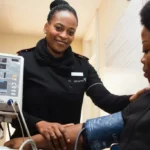Having that talk about STIs in a new relationship is one of those things that can be awkward to do, but it’s very necessary.
It’s normal to feel a bit uncomfortable about it, but in this article, we’re going to walk you through what it takes to have a conversation about STIs and sexual health with a new partner.
Why do I even have to talk about STIs in my new relationship?
In any relationship, it’s very important to recognise the place of open dialogue. Open communication about STIs is essential for several reasons:
- Safety: It helps protect both partners from potential infections.
- Trust: It fosters trust and transparency within the relationship.
- Responsibility: It promotes responsible sexual behaviour.
- Peace of Mind: It reduces anxiety and worries about sexual health.
Tips for talking about STIs in your relationship

Now that we understand why this conversation is essential, here are some tips to help ease the conversation about STIs with your partner:
1. Choose the right time and place
Timing is everything. Find a moment when you both feel relaxed and free from distractions. Avoid the talk about STIs and sexual health in the heat of the moment or immediately before or after sex. Create a safe and non-judgmental environment where both of you can express your thoughts and concerns openly.
2. Educate yourself
Before initiating the conversation, educate yourself about STIs. Knowledge is power, and having accurate information can help ease fears and misconceptions.
3. Start with honesty
For a conversation, this delicate, honesty is quite important. It’s essential to be open about your own sexual history and any past or current STIs you may have had. This sets a tone of trust and encourages your partner to reciprocate.
4. Express Your Concerns
Share your concerns and reasons for wanting to discuss STIs. Use “I” statements to avoid sounding accusatory. For instance, say, “I care about our health and want to make sure we’re both safe” instead of “You need to get tested”. Sounding accusatory may discourage your partner from being honest with you or turn them off the conversation completely.
5. Encourage questions
While you talk about STIs and sexual health concerns, invite your partner to ask questions and express their concerns. Be patient and provide factual information. If you’re unsure about something, it’s okay to say you’ll research and get back to them.
6. Discuss Testing together
Suggest getting tested together as a proactive step in ensuring both of your sexual health. Emphasize that it’s a responsible act, not a judgment of trustworthiness. If you like, you can research STI screening and STI testing clinics near you beforehand so your knowledge can help when discussing this aspect.
7. Communication about protection
While you talk about STIs with your new partner, also discuss safe sex and their opinions on condom use. This adds an extra layer of safety and reduces the risk of STI transmission. This ensures that you’re both on the same page and are being responsible for your health and that of each other.
8. Address Monogamy and Exclusivity
If your relationship involves monogamy or exclusivity, discuss what that means to both of you and define clear boundaries. This can help clarify expectations and reduce misunderstandings, help you take the necessary precautions and lead to a more productive relationship.
9. Regular check-ins
STI conversations should not be a one-time event. Make it a regular part of your relationship’s health check-ins. Regular testing, even when in a monogamous relationship, is a responsible practice.
If you’re in a new relationship and you’d like to get tested for STIs conveniently, discreetly and from the comfort of your home, order a Lemon kit here




